Update: on July 11, 2022, FPL withdrew its extreme winter peak demand proposal from consideration after pushback from the Office of Public Counsel, Commission staff, and Southern Alliance for Clean Energy and allies. It will revert to its Business as Usual demand projection that is consistent with standard industry practice. This is good news for hard-working families and businesses as the proposed extreme winter plan would have unnecessarily increased bills to support overbuilding FPL’s system.
On June 1, 2022, the Florida Public Service Commission (PSC) held its workshop on the 2022 Ten Year Site Plans (TYSP) that were filed on April 1, 2022 by ten utilities. The workshop included presentations by three utilities: Tampa Electric, Duke Energy Florida, and Florida Power & Light (FPL); as well as one expert that was co-sponsored by Southern Alliance for Clean Energy and Vote Solar. Most of the Commissioners’ questions and public comments focused on the FPL plan, so that is where these highlights will focus as well.
First, a little background on the TYSP process in Florida: Ten Year Site Plans are Florida’s version of an integrated resource plan, or IRP. Under Florida statute 186.801, utilities submit a plan to the PSC describing power needs and locations of proposed power plants. Within nine months of receipt of those plans, the PSC must make a preliminary study and classify the plan as “suitable” or “unsuitable,” and can suggest alternatives. Utilities can change their TYSP at any time and submit written notice to the Commission.
Watch the playback of the workshop here under the heading “Other Meetings,” and download the Site Plan documents and workshop presentation slides here.
FPL’s big change in load forecast
The big story of this year’s TYSP process is that FPL has requested the Commission approve a drastic change in the way it forecasts its winter peak demand. The company now wants to use an extreme winter weather event as the basis for its resource planning. If found suitable, the plan will lead to over $400 million in costs to upgrade its transmission and distribution system alone. Additionally, FPL will add another 700 MW of fossil gas plant capacity; continue to keep several fossil gas units online that were slated for retirement; and add an extra 1,900 MW of battery storage on its system from 2027 to 2031, compared to its “business as usual” case and traditional methodology of forecasting winter peak demand. FPL cited several cold winter days in 1989 and 2010 that produced big spikes in electricity demand as support. The company did not provide the probability of such extreme winter events happening in its service territory, if ever, nor alternative methods of addressing them.
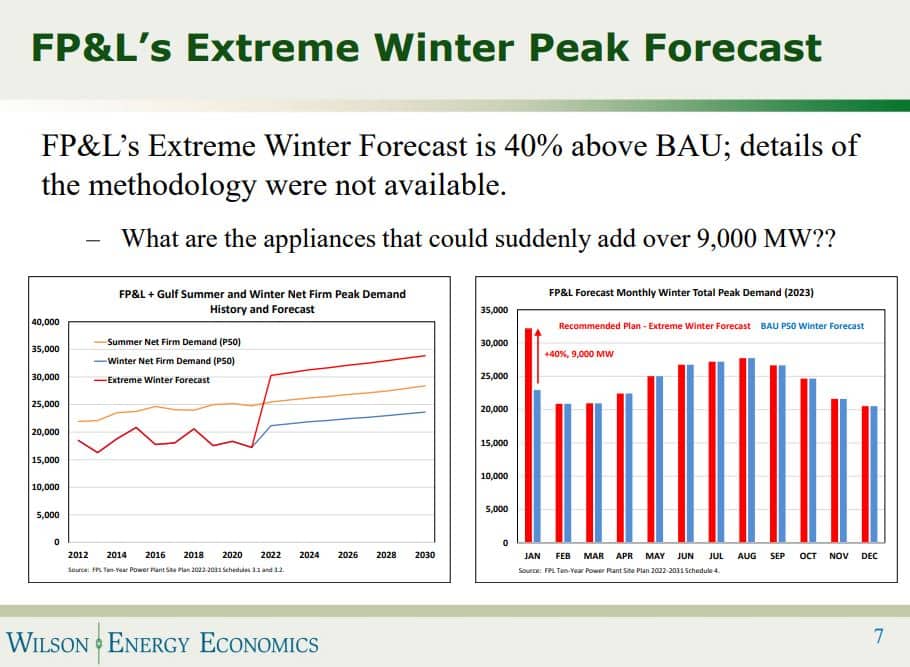
Questions and comments of note
Commissioner Clark asked FPL’s witnesses several questions, including whether FPL had considered system integrations, or coordinating with other utilities, instead of overbuilding its own system to meet an extreme and unlikely peak. FPL’s witnesses did not provide evidence that this was explored, but instead responded that if it’s cold in southern Florida it’s likely cold everywhere.
PSC Staff asked a few key questions, summarized below:
- Q: How long has FPL been using its traditional method for winter peak forecasting
- A: As long as I can remember, so many years.
- Q: Are you aware of any other utilities that are using a similar two-stage process to forecast their winter peak demand based on extreme winter demand for planning purposes?
- A: No.
- Q: Did FPL consider any other models or approaches when looking at the impact of extreme winter weather?
- A: Explains its method again, but does not list any other approaches considered.
- Q: FPL’s new approach results in a 43% increase in peak demand over the traditional approach, which FPL will use to plan its system. Can you explain then why your new approach is reasonable from a planning or regulatory perspective?
- A: New method is not meant to estimate a likely winter peak, but an extreme one. If an extreme winter event were to occur today FPL would face significant customer outages, and the resources kept online or added under the new forecasting method are designed to eliminate those outages.
- Q: Is it more likely that Florida get hit by a hurricane than an extreme winter event?
- A: We haven’t conducted a probability of an extreme winter event, so hard to respond, but Florida is hit with hurricanes regularly.
- Q: Have your customers expressed concern about vulnerabilities of the system under extreme winter weather?
- A: Witness isn’t directly involved in customer service department, so not aware of any customer approaching on this topic.
Southern Alliance for Clean Energy and Vote Solar co-sponsored a presentation by Jim Wilson, a load forecasting expert, showing how FPL’s winter peak forecast method is not standard industry practice and unsuitable.
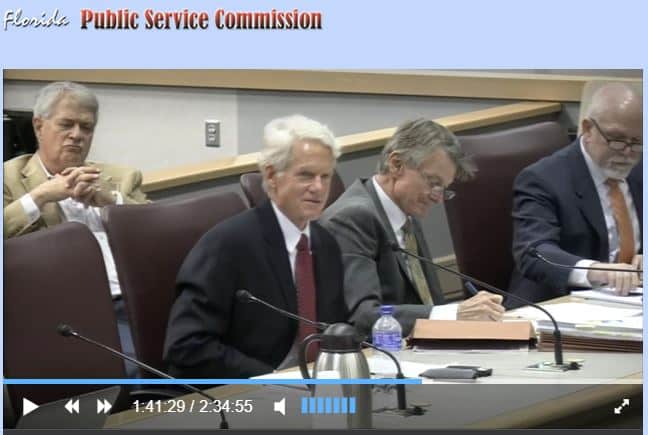
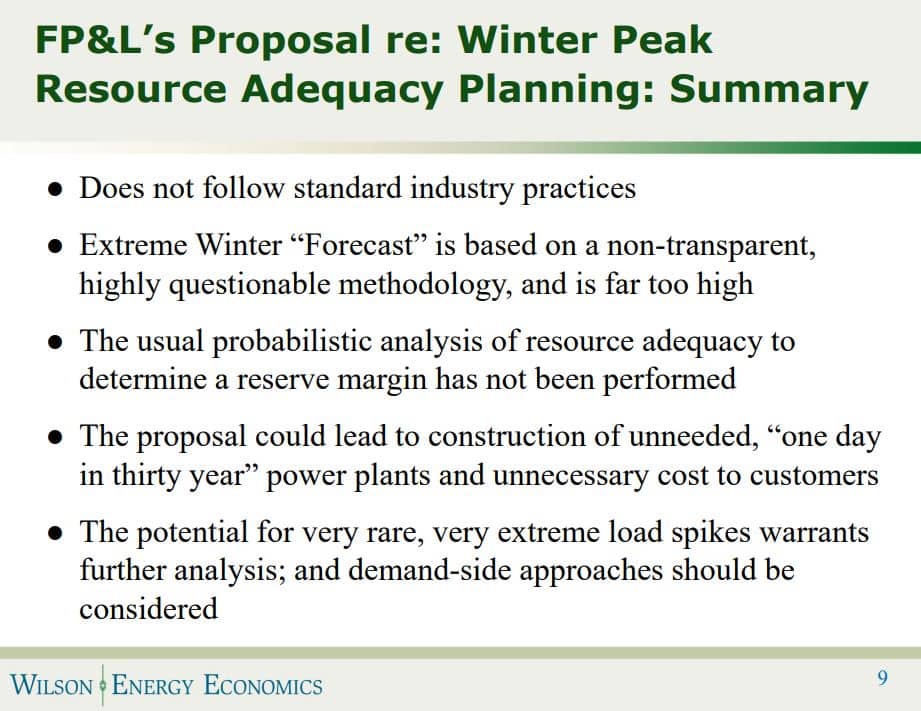
“The beginning of a tsunami, we fear.”
Charles Rehwinkel from the Office of Public Counsel (OPC) made comments indicating that the OPC has rarely participated in the TYSP process because it has been routine. But there is something different in the process this year, and “it might look like a ripple, but is actually the beginning of a tsunami, we fear.” One utility has proposed to deviate from the accepted, normalized weather load forecast that has served the process well; and OPC participated in the workshop explicityly to ask the Commission to reject this proposal. Missing from FPL’s filing is any reasonable evidence that an extreme winter weather event described in FPL’s method is likely to happen again. Furthermore, FPL did not analyze how likely such an event would be. Rehwinkel closed by saying the Commission has the tools and staff expertise to take a deeper dive, as this workshop is inadequate to fully address the matter.
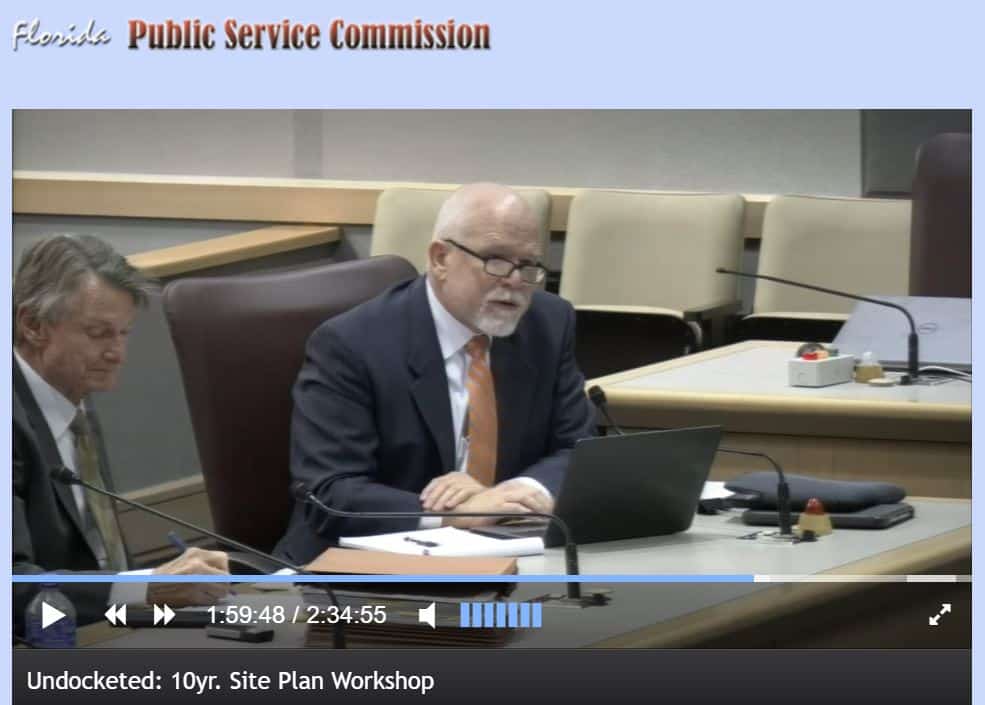
Public comments were generally in opposition to FPL’s proposal, including from Schef Wright, a Florida energy attorney, Kim Ross from ReThink Energy Florida, Bradley Marshall from Earthjustice, Natalia Brown from Catalyst Miami, and Christian Wagley from Healthy Gulf. Key themes include that customers could not absorb any more bill increases, and that there should be more of a focus on investing in energy efficiency to help lower customer bills and keep homes safe and secure, rather than spending customer money on unnecessary investments and propping up old plants to prepare for an extremely unlikely winter event.
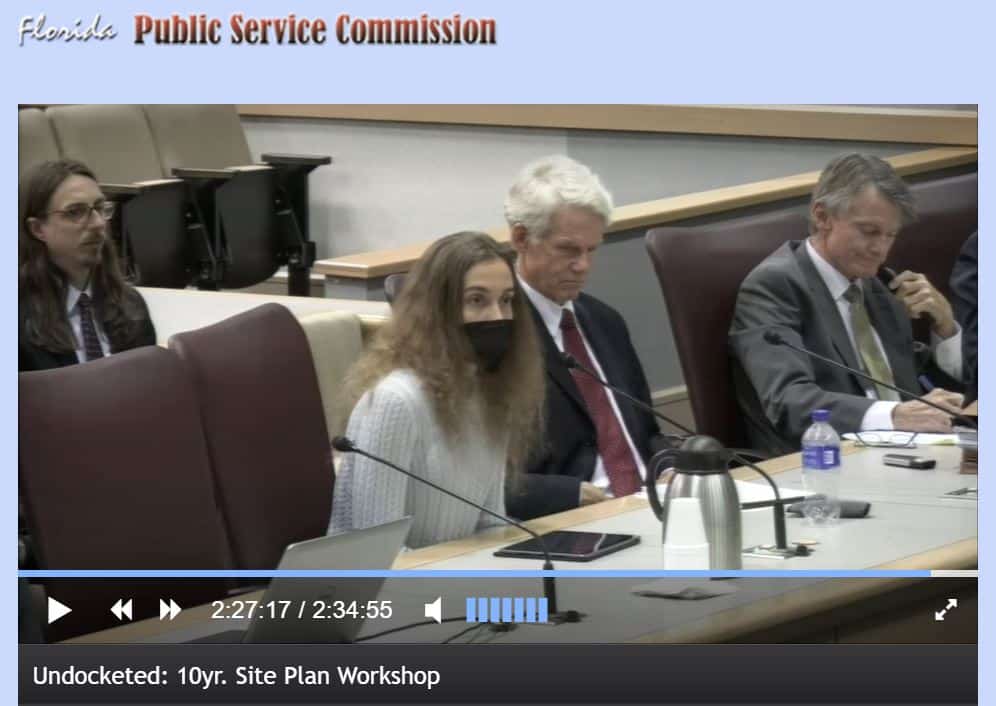
The Commission is accepting comments on the Ten Year Site Plans and workshop presentations for the two weeks following the workshop, so by June 15. Comments should be filed with the PSC clerk at: [email protected], identify them as Ten Year Site Plan comments to be filed in Docket No. 20220000 in the email subject line. As always, we will keep you updated as developments unfold.